

Leadership With LUV: Lessons From Southwest Airlines' CEO. Gary Kelly CEO and Chairman for Southwest Airlines CliftonStrengths Top 5: Achiever | Learner | Context | Positivity | Responsibility Dallas-based Southwest Airlines consistently tops the list of America's most-loved airlines.
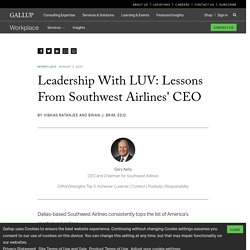
Learning to Embrace Failure. The need to embrace failure is a statement made so often that it borders on being trite.
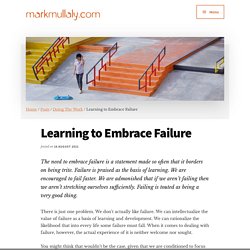
Failure is praised as the basis of learning. We are encouraged to fail faster. We are admonished that if we aren’t failing then we aren’t stretching ourselves sufficiently. Failing is touted as being a very good thing. What Post-Recession Winners Know And Do. Results matter.
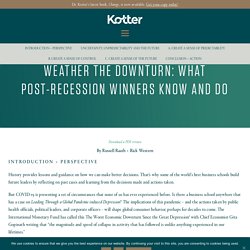
Public companies’ performance scorecards are evaluated quarterly, with consequences for their stock price, access to credit, cost of debt, and ability to carry out strategic plans. Leadership teams play a vital role in this dynamic. Seven key lessons on technology and business. In the past year, the COVID-19 crisis has made clear the business imperative of making technology-driven changes, which are more ubiquitous now than ever.
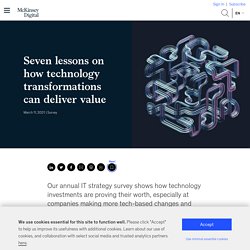
Indeed, our latest McKinsey Global Survey on technology and the business suggests that even in the crisis’s earlier days, respondents were reporting progress on their integration of technology and business—and that these efforts were creating tangible business value across four measures, including new revenue streams and lower costs. The results also suggest that, on average, some transformation activities result in more impact than others (namely, those related to talent and capabilities). And according to the data, the companies with top-performing IT organizations have differentiated themselves from others in their efforts to create value, adopt new technologies, and bring technology and business closer together. More specifically, the results point to seven key lessons about technology transformations. Strategy+business. A version of this article appeared in the Summer 2020 issue of strategy+business.

Every organization today may find itself heading toward an abrupt environmental shift that poses an existential threat, a transformational opportunity, or both. The disruption already happening across all domains is staggering, and it’s picking up speed. But leaders confronting such changes start at a disadvantage. Evolution has endowed humans with traits that don’t mix well with complexity and uncertainty, as such environments tend to make people risk-averse, either impulsive or reluctant to act, and focused on fending off dangers.
To thrive in the years ahead, all organizations, both public and private, will need to make a concerted investment in the knowledge, capabilities, processes, and cultures that foster a distinctive and all-too-rare organizational quality: agility. Ten insights on the state of economic opportunity. As parts of the United States begin the long path to recovery from the health and economic impacts of the COVID-19 pandemic, we set out to understand what Americans think about their current economic standing, their views on economic opportunity, and the barriers they see standing between themselves and a more inclusive and prosperous future.

So we asked them directly. Together with the market-research and opinion-polling firm Ipsos, we surveyed 25,000 Americans in the spring of 2021 in an effort to understand their perceptions of the current and future state of the US economy, to discern firsthand their hopes for the future, and to learn about the challenges they face. We also wanted to establish a baseline of data to better understand how outcomes and perceptions are affected by people’s access to resources, as well as by factors such as their identity, education, and level of caregiving responsibility. What we learned was sobering. Seven key lessons on technology and business. Crisis Response: Insights From A Leadership Team Who Did It Well.
By Jimmy Leppert, Managing Director + Rod Walker, President of Consulting In the world of complex changes, a global pandemic easily outranks any number of other highly nuanced circumstances that organizations must maneuver within and around.
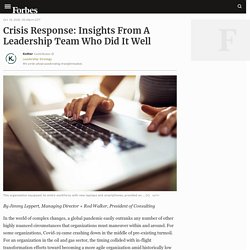
For some organizations, Covid-19 came crashing down in the middle of pre-existing turmoil. For an organization in the oil and gas sector, the timing collided with in-flight transformation efforts toward becoming a more agile organization amid historically low oil and gas markets, workforce reductions and now – Covid-19. Summary of 12th Global Peter Drucker Forum 2020. Lessons on Leading Through Chaos from U.S. Special Operations. “I’m sure the other candidate checks all the boxes,” a veteran of the U.S.

Navy SEALs told his final-round interviewer at a financial services company. “But here’s one thing I can tell you about me: There’s not a single situation that will occur at this business that will make me feel uncomfortable.” With that answer, the SEAL won himself a job, beating out a traditionally better-qualified candidate with an MBA from a leading business school. The American business community’s discovery of the U.S. Special Operations Forces (SOF) hasn’t come a moment too soon. NHL commissioner Gary Bettman shares lessons from the bubble. Accenture CEO on how 2020 has transformed business. From PPE to Denim and Beer, Here’s What the Pandemic Is Teaching Us about Supply Chains. Taking Stock of the Covid-19 Recession.
Executive Summary Where are we, six months into the coronavirus recession?

The authors look back at five common expectations from the early days of the crisis and how they differ from where we are today. A new stock exchange focused on the long-term. Learning from an agile operating model. This article was a collaborative effort by Christopher Handscomb, Deepak Mahadevan, Lars Schor, and Marcus Sieberer of McKinsey and by Euvin Naidoo and Suraj Srinivasan of the Harvard Business School.

It represents views from across McKinsey’s Agile Tribe. For many companies, the first, most visible effects of the COVID-19 pandemic quickly created a challenge to their operating and business models. Everything came into question, from how and where employees worked to how they engaged with customers to which products were most competitive and which could be quickly adapted. To cope, many turned to practices commonly associated with agile teams in the hope of adapting more quickly to changing business priorities. COVID-19’s Uncomfortable Revelations About Agile and Sustainable Organizations in a VUCA World (2020) Organizations confronting the realities of a COVID-19 world find themselves managing challenging and unprecedented demands: redeploying talent, establishing remote workforces, building needed capabilities, propping up distressed supply chains, contributing to humanitarian efforts, choosing among firing/furloughing/retaining employees, and planning for reopening amid uncertainty.
In this context, the crisis has revealed three implications for research and practice on agile and sustainable organizations in volatile, uncertain, complex, and ambiguous (VUCA) environments. First, how to characterize the COVID virus and our response to it is unclear; what is clear is that we were unprepared. Second, despite the rhetoric, too many organizations did not have the capabilities to respond. Saying you are agile does not make it so. Lessons in Rapid Innovation From the COVID-19 Pandemic. Topics Frontiers An MIT SMR initiative exploring how technology is reshaping the practice of management. See All Articles in This Section The coronavirus pandemic is one of the most difficult collective challenges facing humanity since the last world war. The Smart Spaces Revolution That’s Enhancing Manufacturing Safety and Efficiency. Video and 3D light detection and ranging technologies are the latest smart technologies changing the way manufacturers improve their processes.
The addition of video and 3D light detection and ranging to other intelligent systems, such as the internet of things (IoT), artificial intelligence and rapid prototyping, are the building blocks of “smart spaces.” Smart spaces can be found in factories, city streets, power plants, industrial operations, retail stores and airports, among others. Video-capture systems, which apply computer vision and AI technologies, provide a holistic, 360-degree view of an environment. They can automatically detect when worker or pedestrian walks into a restricted or hazardous area, or an object is in a place it shouldn’t be. In this eBook you will learn how manufacturers can use smart video systems and IoT to: Lessons from Chinese Companies’ Response to Covid-19. The past four months have provided an opportunity to study a once-in-a-lifetime moment — how companies function during an unprecedented global pandemic while also navigating an accelerated shift to digital operations.
China was weeks ahead of the rest of the world in dealing with the pandemic and its fallout, so their experience is of interest. We conducted a series of 20 in-depth, in-person interviews, as well as a large-scale survey of more than 350 senior executives, to ascertain how the Chinese corporate world has adapted, innovated, survived — and even thrived — through this uncertain time. The companies we looked at, which ranged from state-owned enterprises to multinational corporations to local private companies, were forced to quickly: As China emerges from its Covid-19 lockdown, it is becoming clear that many of the challenges they faced are here to stay – and that some of the changes they introduced should be, as well. 1. Coronavirus: 15 emerging themes for boards and executive teams.
As Winston Churchill said, “Now this is not the end. It is not even the beginning of the end. But it is, perhaps, the end of the beginning.” We are seeing some faint signs of progress in the struggle to contain the pandemic. But the risk of resurgence is real, and if the virus does prove to be seasonal, the effect will probably be muted. It is likely never more important than now for boards of directors and executive management teams to tackle the right questions and jointly guide their organizations toward the next normal. What wartime analogies do (and don’t) teach us about COVID-19. Organizational Agility: Insights from the Thinkers50 Event - Interview with Howard Sublett. Organizational Agility: Insights from the Thinkers50 Event - Interview with Alexandra Levit. Learning from Crisis Mode.
Business lessons on crisis management from Albert Camus. What have we learned from the decade of digital? The One Reason Why Families, Companies, and Countries Don’t Get Along. This Is the Single Biggest Mistake Companies Make When It Comes to Handling Their Competitors. Crisis management needs a strong plan and strong leaders. Learning from the Digital Leaders. The Missing Ingredient in Kraft Heinz’s Restructuring. Keynote speaker John Seely Brown's 2019 commencement address. Insight Economy 2019. Here's How 3 of the World's Worst CEOs Almost Killed Their Companies by Creating a Toxic Culture. Agile ways of working: the only way forward for business? Amazon Almost Killed Best Buy. Then, Best Buy Did Something Completely Brilliant. The sum is greater than the auto parts. Davos 2019: Key Takeaways. From Diagnosis to Action: Reflections from Davos. Six lessons on how to embrace the next-generation operating model.
Here’s how companies can drive growth for all. Lessons from corporate behavioral-science units. Michael Green: The global goals we've made progress on. The Rijksmuseum’s agile process: An interview with director Taco Dibbits. Le paradoxe de la stupidité organisationnelle. Beyond Budgeting Case Study - tw telecom. What the Military Can Teach Organizations About Agility. Houston Astros: winning the World Series with advanced analytics. How Adidas Found Its Second Wind. GE’s Fall Has Been Accelerated by Two Problems. Most Other Big Companies Face Them, Too.